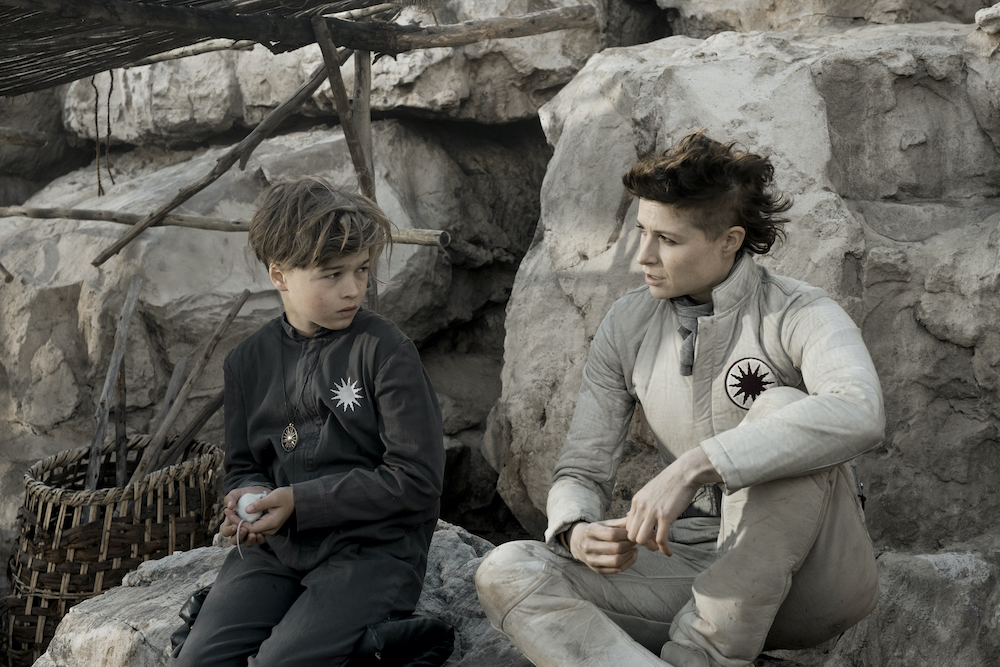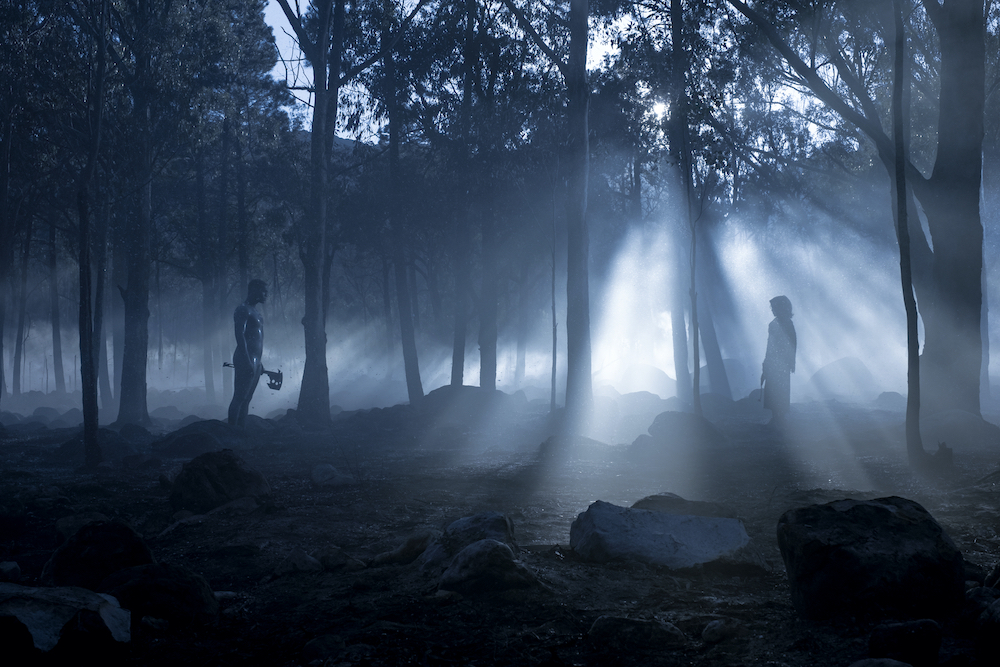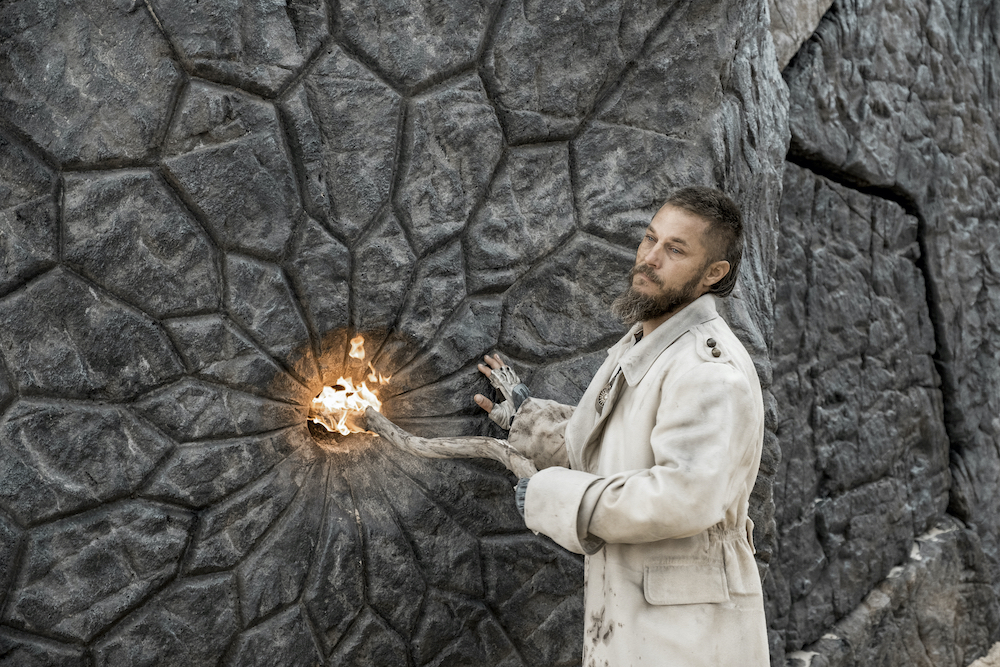
Scene from Season 1, Episode 8 of "Raised by Wolves," with Felix Jamieson, left, and Niamh Algar on HBO Max (Warner Media/Coco Van Oppens)
"Raised by Wolves," a television series created by Aaron Guzikowski and released on HBO Max last September, initially feels like many other works of science fiction: set in a dystopic future where the Earth is destroyed and competing groups escape to other planets for survival. Yet in just 10 episodes, it becomes clear how deceptively profound the show truly is, and for Catholic viewers especially, there is much for us to contemplate.
The pilot begins following two androids, Mother and Father, who escaped from a war on Earth between atheists and a religious order known as the Mithraics. Mother and Father, reprogrammed and tasked with rebuilding the human race and civilization, now live on the extrasolar planet, Kepler-22b. They left Earth with six embryos, but only one survives. They, along with their last surviving son, Campion, struggle to survive on Kelper, all the while believing they are the planet's only inhabitants. Soon after, however, the Mithraics arrive, along with the violence of the world they thought they left behind.
The Mithraics, based on the first century Roman cult, are a group of warriors and priests who believe in a rigid caste system. They are more militaristic and technologically advanced than the androids or atheist humans. Once they arrive on Kepler-22b, their struggle to survive challenges their faith in ways they are not entirely prepared for. For them, religion is a matter of adhering to their sacred texts, and there is no room for question. Unlike the Christian faiths of our world, they are not contemplative. This is something that is put to the test on the new planet, and although their faith is unreflective, different characters are forced to contemplate and reexamine who they are following, and whether their god Sol's will is always being expressed by the one who is ordained a leader. Androids and humans, on the other hand, want no relationship with any kind of faith tradition, but despite themselves are drawn into areas that rationality cannot explain and they are forced to express a kind of faith and trust both in themselves and each other when facing the unknown.
Advertisement
Violence soon escalates on the new planet over these religious differences, with each side believing their respective opinion concerning belief, rationality and faith the superior one. Each individual character struggles with their own personal understandings of faith. Some are more rigid in their desire to follow the laws of Sol, while others question Sol's will and abandon their faith when given the first opportunity to do so. When Marcus, a former child soldier for the atheists who assumed the identity of a Mithraic soldier, begins to hear the voice of Sol commanding him, he becomes filled with pride. Some look upon this revelation with awe and wonder, but other higher-ranking clerics, filled with jealousy, seek to supplant him.
These people, with their own pasts and hopes and fears, all are in competition with one another and this mysterious new world as they each try to figure out what really matters to them in order to build a future and survive. For the Catholic viewer, this is a worthwhile opportunity to reflect about our own will and faith and how each is expressed in our lives.

Scene from Season 1, Episode 8 of "Raised by Wolves," with Abubakar Salim, left, and Winta McGrath on HBO Max (Warner Media/Coco Van Oppens)
This engagement with faith will feel familiar to fans of works like "Alien" and "Blade Runner." Ridley Scott, an executive producer, directed the first two episodes, and like other Scott works, the show encouragers viewers to think more deeply about consciousness, the soul and the role of religion in human life. In "Blade Runner," the idea of androids possessing souls is toyed with, and in "Prometheus" and "Alien Covenant," we see characters attempting to play God and change change creation.
Religious elements are even more fleshed out in "Raised by Wolves" by Scott and Guzikowski, a lapsed Catholic. Many things in the show feel similar to our own world like the war between believers and atheists. In the first episode, Father, realizing that Campion must not be raised alone, signals the Mithraic ship. When Mother finds out, she kills father in a rage. This murder evokes Cain and Abel and instills a sense in us that although the world we are watching on screen is new, the stories and lives of these characters are universal.
The show, which initially presents itself as a series about rational atheism versus blind faith, offers a powerful commentary on the dangers of fanaticism. The beliefs of the Mithraics, humans and androids, no matter how adamantly they believe in their convictions, are insufficient. Each character's rationalism or blind faith is tested, pushed and sometimes broken, and each character, and viewer, is left with more questions than answers.
"Raised by Wolves," which was renewed for a second season several weeks after its premiere, will keep the viewer coming back for more because it is so unlike other shows available on streaming services. It challenges how we think about morality and although this is not explicitly a "Catholic" show, it very much shows an engagement with religious themes and ideas that a Catholic worldview lends itself to understanding, and it does all this without watering down the complexity of the series.

Scene from Season 1, Episode 9 of “Raised by Wolves,” with Travis Fimmel on HBO MAX (Warner Media/Coco Van Oppens)
In an era where shows are designed to be consumed as quickly as possible, "Raised by Wolves" challenges us to slow down, chew over every episode and think about how religion informs how we view the world around us.
For Catholic viewers, the show — which premiered amid a global COVID-19 pandemic and anti-racism marches all across the United States — encourages us to confront our understanding of the Catholic imagination and engage with art that might not seem readily "Catholic" but that nevertheless can offer us glimpses of the truth, for all art touches the sublime in some way or another.







